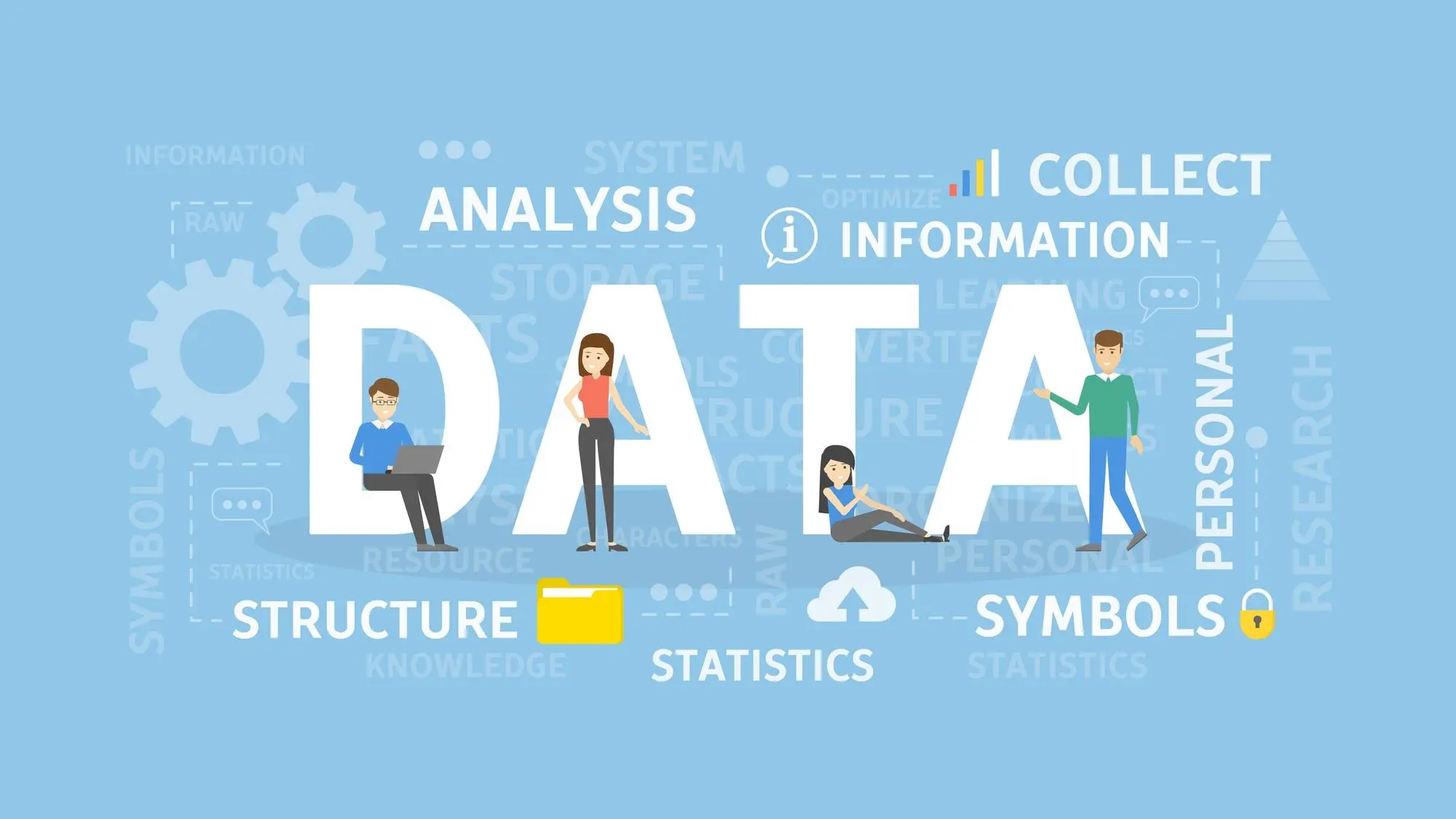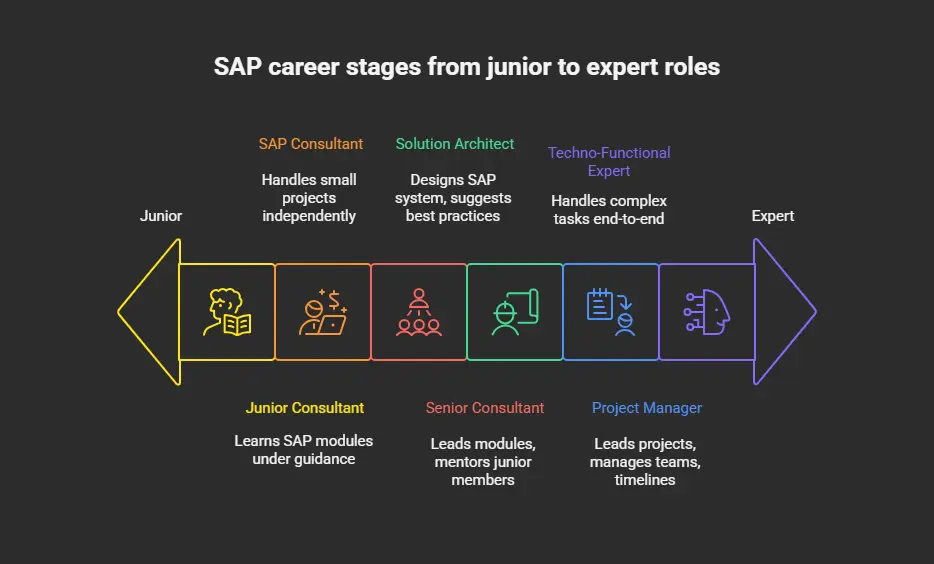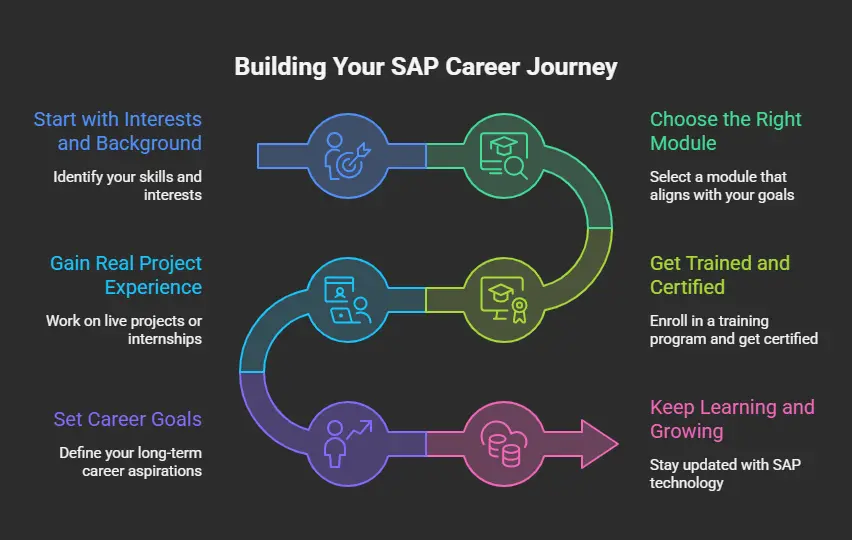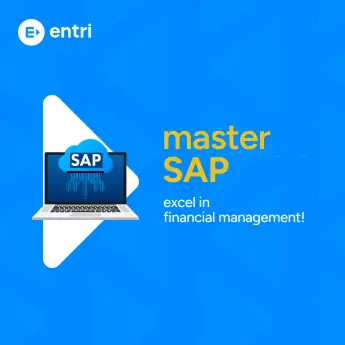Table of Contents
SAP is one of the most popular and widely used software systems in the world, especially in large businesses. It helps companies manage their operations smoothly—from finance and sales to supply chain and human resources. Because of its wide use, there is a strong demand for skilled SAP professionals in India and around the globe.
If you think of a career in SAP, it’s a smart alternative. Whether you are a fresher or a working professional, looking to change field, SAP offers a series of career options in different modules. In this blog we will go through the SAP career path, their key module, the job roles and how to start these role in step by step.
Choosing Between Functional and Technical Roles
When you start a career in SAP, one of the first decisions you need to make is whether to go for a functional or technical role. Both role give rise in career growth, but they are quite different in terms of skills, responsibilities and work style. Understanding the difference can help you choose the role that matches your background, interest and long-term goals.
🟠 What is a Functional Role in SAP?
SAP functional roles focus on business processes. As a functional advisor, you work closely with customers to understand your business needs and then establish the SAP system to match these needs. You do not need to do any coding, but you should know how different departments work in the company – such as finance, sales, inventory or human resources.
For example, if you work in the SAP FICO module (finance and controlling), you must understand how financial transactions, reporting and budget work. Similarly, in SAP MM (material management), you will handle purchases, stock management and suppliers.
Functional roles are a good fit for people who:
-
Should posses background in business, finance, supply chain, or HR
-
Enjoy solving real-world business problems
-
Should prefer working with people and processes rather than coding
-
Should have good communication and analytical skills
🟠 What is a Technical Role in SAP?
The technical roles in SAP include working with the system from Backend. This means that you want to handle coding, customization and system performance. The most common technical role is a SAP ABAP developer. ABAP (Advanced Business Application Programming) is a programming language used to write a customized program in SAP.
In technical roles you can create a customized report, design screens, write programs or integrate SAP with other systems. You often work with functional advisors who guide you about what is needed and you do so by using the code.
Technical roles are ideal for people who:
-
Should posses a background in computer science, IT, or engineering
-
Enjoy programming, problem-solving, and working with systems
-
Should prefer working behind the scenes rather than with end-users
-
Are comfortable learning new technologies and tools
🟠 Which Role Should You Choose?
The right role depends on your background, interests and career goals. If you come from a business or any commerce background and prefer to work with business processes, a functional role may be the best for you. On the other hand, if you have a technical or programming background, and like working with the code and system, a technical role can be a better fit.
It is also important to know that both role provide good pay, job security and development. Many professionals start in an area and learn later skills from the other side to become technical functional advisers, who are in demand.
Join Entri’s SAP FICO Training Course today!!
Career Stages Across Both Tracks (0–12+ Years)
Whether you choose a functional or technical role in SAP, your career grow continuously over the years. SAP offers long-term development, good wages and global opportunities. When you gain more experiences, your role, responsibilities and skills will change. Let’s look at what a specific career growth over 0-12+ years in both SAP-functional and technical paths.
0–2 Years: Entry-Level/ Junior Consultant
At the beginning of the SAP career, you usually begin as a junior consultant or SAP trainee. Your main focus will be on learning. You will work under the guidance of senior advisers and help in basic tasks such as:
-
Understanding SAP modules
-
Assisting in configuration or development
-
Testing the system
-
Creating simple reports or documentation
If you are in a functional role, you will learn how business procedures work in SAP (eg sales, purchasing, finance). If you are in a technical role, you will start code in ABAP, work with basic development work and understand system structures. At this stage, focus on learning, gain hands-on-experience and being certified in the selected module.
2–5 Years: SAP Consultant
With 2-5 years of experience, you become a full-time SAP advisor. Now you can handle small projects or specific parts of larger projects.
- Leading small tasks or change requests
-
Talking to clients or users to gather requirements
-
Doing system configuration or writing advanced programs
-
Supporting live systems (maintenance and issue fixing)
Functional consultant begin to understand how different SAP modules work together, while technical consultant are better in customized development, troubleshooting and integration tasks. So far you hope to work more independently and start creating your expertise in specific modules such as SAP FICO, MM, SD (functional) or ABAP, BASIS, PI/PO (technical).
5–8 Years: Senior Consultant/ Module Lead
In this phase you are seen as a senior consultant or module specialist. You could take ownership of a full module or field in a project. Your work includes:
-
Leading project modules or teams
-
Mentoring junior team members
-
Managing client communication
-
Providing solutions for complex business or technical issues
-
Participating in blueprinting, design, and implementation phases
You can start searching for the respective modules or technologies to become more versatile. Clients and companies are now dependent on your experience to make better SAP decisions.
8–12+ Years: Solution Architect / Project Manager / Techno-Functional Expert
After 8-10 years, your SAP career can go in different directions based on your interest:
-
Solution Architect: You design the overall SAP system for a business and suggest the best practices.
-
Project Manager: You are leading the entire SAP projects, managing teams, timelines and client expectations.
-
Techno-Functional Consultant: You mix both technical and functional knowledge to handle complex tasks.
Master SAP with Expert-Led Courses
Unlock your potential with our comprehensive SAP courses! Learn essential modules like SAP MM (Materials Management), SAP SD (Sales and Distribution), and SAP FICO (Financial Accounting and Controlling) from industry experts.
Know MoreWhich Modules & Skills Influence Your Path
In SAP, your career relies upon much of the module you choose and the skill you have developed. Each SAP module is related to a specific field of business or technology, and choosing the right one primarily based on your background and interest will craft your career path.
1. Functional Modules – For Business & Process-Focused Roles
Functional modules are best for people who have a background or interest in business processes like finance, sales, supply chain, or human resources. Some of the most popular functional modules include:
- SAP FICO (Finance and Control) – Ideal for people with accounting or financial background.
- SAP mm (material management) – Great for those interested in procurement, inventory or supply chain.
- SAP SD (Sales and Delivery) – Perfect for people with sales or marketing experiences.
- SAP HCM (Human Capital Management) – HR or people with people with leadership knowledge.
Choosing a functional module means that you want to work closely with clients to understand their business needs and configure SAP to support those needs. Over time, ou cany grow in roles such as Senior Functional consultant, Solutions Architect or Business Process Specialist.
2. Technical Modules – For Code & System-Oriented Roles
If you like working with technology, programming or system administration, technical modules can fit you better. General technical modules include:
- SAP ABAP (Programming Language) – for customized development and coding in SAP.
-
SAP BASIS – Focuses on installation, maintenance and performance.
-
SAP PI/PO (Process Integration) – Helps connect SAP to other systems.
-
SAP BTP (Business Technology Platform) – For cloud solutions and advanced application development.
If you have a background in IT, Computer Science or Engineering, Technical roles fit well. You will behave more with SAPS Backend and can develop in roles such as Technical architect, Integration Specialist or SAP Developer Lead.
3. Techno-Functional Skills – The Best of Both Worlds
After a few years, many consultant build skills in both technical and functional fields. These are called techno-functional consultants. For example, a person in FICO may learn basic ABAP to understand the customized report, or a developer can learn business processes for users better support.
Having both sets of skills makes you more valuable, especially for senior roles where you need to understand both how the business works and how SAP supports it technically.
4. Soft Skills That Matter
Apart from SAP knowledge, your success also depends on important soft skills:
-
Good communication – Talking clearly with customers and team members.
-
Problem-solving skills – To find the right solution when there is any problem.
-
Learning mindset – SAP changes, so you have to learn.
Join Entri’s SAP FICO Training Course today!!
Drivers of Salary & Demand
A career in SAP is known for strong growth, great demand and offers good pay package. However, not everyone in SAP earns the same. Salary and job needs depend on many factors, such as your skills, experiences, chosen modules and types of projects you have worked. Let’s find out the key factors that affect salary and demand in SAP careers.
🟠 Chosen SAP Module
The module you work plays a big role how much you can earn and how soon you can grow. Some modules are always in demand because they are used in almost all companies. These include:
-
SAP FICO (Finance and Controlling)
-
SAP MM (Materials Management)
-
SAP SD (Sales and Distribution)
-
SAP ABAP (Technical Development)
More advanced or high modules such as SAP S/4HANA, SAP BTP, SAP SuccessFactors, and SAP Analytics Cloud are also increase demand. Since fewer people are skilled in these areas, experts in these professionals can earn a high salary.
🟠 Years of Experience
Experience is one of the biggest salary drivers in any SAP role. When you gain more experiences, your salary increases. Here is a common idea of how experience affects:
-
0–2 years (Entry level): Basic salary, mostly focused on learning
-
2–5 years: Higher pay as you handle real-time projects
-
5–8 years: Senior-level roles with leadership responsibilities and better pay
-
8+ years: Architect or project manager roles with the highest salary brackets
The more projects you work and the more complex problems you solve, the valuable you become for companies.
🟠 Project Type and Industry Exposure.
Working with live implementation projects or SAP upgrades/migrations (like S/4HANA) adds strong value to your portfolio. These projects are more challenging and give you deep knowledge, which gives importance to the employer.
In addition, working in industries such as production, retail, banking or health care, which depends a lot on SAP, can help increase your demand. Global projects or experience with clients also add to your profile strength and help you increase your earning capacity.
🟠 Certifications and Learning
The official SAP certificate in your module can increase your chances of hiring and earning more. Certificates suggest that you have ready to implement your skills and knowledge. In a competitive environment, certified professionals often differ. In addition, your skills regularly update with cloud tools or integration methods for learning as SAP technology.
🟠 Location and Company Type
The location of your job and the type of company you work can also affect salary. For example:
- Jobs in metro cities such as Bangalore, Mumbai, Hyderabad, Pune and Delhi usually offer higher wages.
- Working for MNCs, top IT companies or SAP partner companies often provide better pay packages than small local companies.
Building Your SAP Career Plan
Starting a career in SAP is a good choice, however to grow and succeed, you need a clear plan. Without a clear focus, there is a chance to lose or get stuck. A proper career plan helps you move forward step by step, analyze the right skills and take the best opportunities.
1. Know Your Interests and Background
Start thinking about your education and your work experience. If anyone from a financial, HR or supply chain background, a functional SAP module like FICO, HCM or MM may be a good fit. If you have an IT background, you can improve technical roles such as ABAP development or SAP BASIS. Choose a path that matches your skills and interests. When you like your work, it becomes easier to learn and grow.
2. Choose the Right Module
SAP has many modules. Each module focuses on a separate field of business or technology. Some common options include:
-
SAP FICO – Finance and accounting
-
SAP MM – Purchasing and inventory
-
SAP SD – Sales and distribution
-
SAP HCM – Human resources
-
SAP ABAP – Programming and development
-
SAP Basis – System and server management
-
SAP SuccessFactors/ S/4HANA – Cloud-based and advanced SAP tools
Do some research, talk to professionals, or make a demo section before making a decision. The right module will shape your future role and salary.
3. Get Trained and Certified
Once you have chosen your module, the next step is training. Join a good training program to learn both theory and practical, either online or offline. Make sure the course includes examples of real time and access to the system. After training, try to be certified SAP.
4. Gain Real Project Experience
If possible, work on live projects or internships. Real experience is the same as training. In your initial job, focus on gaining knowledge of the fundamentals and understanding how SAP is used in actual groups. Ask questions, take notes and learn from the seniors on your crew. Every small task you do is added for to your knowledge and confidence.
5. Set Career Goals
Think about where you want to be in 3, 5 or 10 years. Want to become a senior consultant, solution architect or project manager? Setting the goal helps you to focus and plan the next stages as learning a new module, switching roles or joining large projects.
6. Keep Learning and Growing
The SAP technology changes rapidly. To be relevant, keep learning. Follow the SAP blog, join online communities, participate in webinars and take simple courses on updates such as SAP S/4HANA, SAP Fiori, or SAP BTP.
Master SAP with Expert-Led Courses
Unlock your potential with our comprehensive SAP courses! Learn essential modules like SAP MM (Materials Management), SAP SD (Sales and Distribution), and SAP FICO (Financial Accounting and Controlling) from industry experts.
Know MoreLong-Term Growth & Transition
A career in SAP is not just a job-it is a long-term journey where many opportunities grow, learn and transfer to better roles. When you gain experience and create your skills, your career can move on in new and exciting directions. Many professionals who start as junior consultants become experts, team leaders, project managers or even independent advisors.
1. Growth with Experience
During the first few years, your attention is mainly on learning and gaining experience. You work with basic tasks, support projects or help with implementation. But when you get 3-5 years of experience, you become more confident in handling the customer’s needs, solving real problems and dealing with your own tasks.
With 5-8 years of experience, you can enter a senior consultant role, where you lead small teams, guide junior members and handle complex tasks. Your decisions begin to directly affect projects and customer satisfaction.
2. Transition to Leadership Roles
Once you have gained enough technical or functional experience, you can switch into leadership roles. These roles not only require SAP knowledge, but also good communication, planning and decision skills. This includes:
- Team Lead – You guide a team of advisors and ensure that their work is on the field.
- Project Manager – You manage the deadline, budget and customer communication for full SAP projects.
- Solution Architect – You design the best SAP solution for the company’s needs in many modules.
3. Becoming a Techno-Functional Expert
Some SAP professionals choose to learn technical and functional skills. These are called technological functional consultants. For example, a functional SAP FICO consultant can learn basic ABAP coding, or an ABAP developer can learn how financial processes work in SAP. Being technically functional makes you more flexible and valuable, especially to handle complex requirements where both business and technical knowledge are needed.. This role is in great demand and often pays better.
4. Independent Consulting or Freelancing
After 8-10 years of experience, many SAP experts choose to work as independent advisors or freelancers. They offer their services to companies based on a project, often earn more and have more control over their time. Freelancing is best if you want to work in a free space, already a strong network, and can manage your work independently.
5. Specializing in New SAP Technologies
SAP is always evolving. Technologies like SAP S/4HANA, SAP Fiori, SAP BTP, and SAP Cloud solutions are becoming more popular. Professionals who learn and have experts in these new areas, they can stay ahead in their careers and get better job opportunities. Investment time to learn new skills ensures long-term development and keeps your profile strong in the competing job market.
Realistic Advice & Common Pitfalls
Starting a career in SAP may be thrilling and worthwhile, but it also comes with demanding challengess. Many people get into SAP field with high expectations. In order to build a robust and successful SAP career, it is important to understand what to expect, be organized for ups and downs and avoid simple errors. Here are a few sensible recommendation and simple suggestions that help you stay on the right path.
🟧 Be Patient in the Beginning
Many people expect quick success and high pay after completing the SAP course. But the truth is that SAP is a vast field, anh have great career growth. Your first job can be a support role or a small project. Focus on learning and creating hands-on experience Be patient and give youself time to grow. Each expert started entry level position in SAP.
🟧 Choose the Right Module Based on Your Background
A common mistake is choosing a SAP module because it is “popular” or promises high pay. However, if the module does not match your interest or background, you may lose your interest or hard to learn. For example, a person with a financial background is better suited for SAP FICO, while someone from IT may do well in ABAP or Basis.
🟧 Don’t Skip the Basics
Another disadvantage is to try to learn everything quickly. Many new learners switch into advanced subjects without understanding the basics. It creates confusion and makes interviews or actual projects difficult. Take time to understand core concepts. First, build a strong foundation – whether in configuration, coding or system navigation.
🟧 Certifications Help, But They’re Not Enough
Being SAP certification can boost CV and help in interview, but certification alone did not guarantee the job. Employers seek real skills and practical experience. Therefore, after training or certification, practice regularly. Use the SAP Practice System, join mock test preparations or try internship to create experience.
🟧 Keep Learning – SAP Keeps Changing
SAP constantly develops with new technology inclusive of S/4HANA, Fiori, and cloud-based systems. Stay up to date by means of analyzing SAP blogs, becoming a member of forums, participating in webinars or taking online courses. Continuous learning is relevant and important to grow in your career.
🟧 Don’t Compare Your Progress with Others
Some people get placed faster or move up more quickly. That doesn’t mean you’re doing anything wrong. Everyone’s journey is different. Stay focused on your path, keep improving your skills, and opportunities will come your way.
Some people get placed quickly. This does not mean you are doing something wrong. Everyone’s journey is different. Focus on your way, improve your skills, and the opportunities.
Join Entri’s SAP FICO Training Course today!!
Conclusion
A career in SAP offers a wide range of opportunities for strong growth, high demand and both technical and functional professionals. Whether you’re palnning to change profession, SAP has something for everyone – be it in finance, logistics, HR, programming or system management. With the proper training, a clean plan and the preference to research continuously, you could construct a strong and rewarding future inside the SAP field.
Choosing the right module, getting actual project experience, updating with new techniques including SAP S/4HANA and cloud solutions, and avoiding general errors will help you grow with confidence. SAP isn’t only a task-it could be a long-term career with global opportunities and excellent earning ability. Start profession in entry-level role, be consistent and get career growth gradually. Your SAP journey can cause a bright and successful future.
| Related Links | |
| Top SAP Interview Questions and Answers (2025) | What Is SAP? Where is it Used? |
| SAP MM Interview Questions and Answers | SAP FICO Interview Questions and Answers |
Master SAP with Expert-Led Courses
Unlock your potential with our comprehensive SAP courses! Learn essential modules like SAP MM (Materials Management), SAP SD (Sales and Distribution), and SAP FICO (Financial Accounting and Controlling) from industry experts.
Know MoreFrequently Asked Questions
What is SAP and why is it important for a career?
SAP (Systems, Applications, and Products) is one of the most widely used enterprise software systems in the world. It helps businesses manage everything from finance and sales to human resources and supply chain. Because so many companies use SAP, there is a high demand for professionals who can work with it. Learning SAP can open doors to stable, well-paying jobs in India and around the world.
Who can start a career in SAP?
Anyone can start a career in SAP, whether you’re a fresher, a working professional, or someone looking to switch careers. If you have a background in commerce, finance, HR, or supply chain, a functional role may be a good fit. If you come from an IT or engineering background, you may enjoy working in a technical role like ABAP development or system administration. The key is to choose a module that matches your interest and skillset.
What are the different career paths in SAP?
SAP offers two main career paths:
-
Functional roles, where you work with business processes (e.g., SAP FICO, MM, SD, HCM).
-
Technical roles, where you handle programming, system support, or integration (e.g., SAP ABAP, BASIS, PI/PO).
As you grow, you can move into senior roles like Solution Architect, Project Manager, or become a Techno-Functional Consultant by learning both business and technical sides.
Do I need a certification to start my SAP career?
SAP certification is not mandatory, but it can definitely help. A certification shows that you have formal training and understand the basics of your chosen module. However, employers also look for hands-on experience and real-time project knowledge. So, while a certification is a good starting point, practice and real-world exposure are just as important.
How long does it take to become successful in SAP?
Success in SAP doesn’t happen overnight. It usually takes 2–3 years of real project experience to become confident and independent in your role. Your growth will depend on how much effort you put into learning, the quality of your projects, and how well you adapt to new updates like SAP S/4HANA or cloud technologies. With consistent learning and the right guidance, you can build a strong and long-term SAP career.
What is the salary range in an SAP career?
SAP professionals are generally well-paid. A fresher or junior consultant can earn between ₹3–6 LPA. With 3–5 years of experience, salaries can range from ₹7–12 LPA or more. Senior consultants and specialists in high-demand areas like SAP S/4HANA, SAP BTP, or SAP Analytics can earn ₹15 LPA and beyond. Your salary depends on your module, skills, experience, location, and the company you work for.














